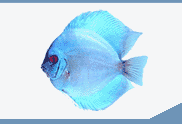

 |
||||||||||||
 |
||||||||||||
| Blackworm culture (Lumbriculus variegatus) for use as a live fish food for the Hobbyist | ||||||
| Al Sabetta | January 1, 2002 | |||||
This culture method is based on one that was kindly provided to me by Dr. Charles D. Drewes at Iowa State University for use in some of my science workshops. A variation of it is also recommended by Carolina Biological Supply Company for their cultures (the article is viewable at Carolina's website and was written by Dr. Drewes). To set up the culture, brown paper towels are placed in a suitable container such as a fish tank. Clean water (De-ionized or Reverse osmosis water) is poured to a shallow depth of several inch over that. Black worms from a clean source are used to start the culture. These are added to the culture. Aeration with an air stone is recommended. This culture does not need to be refrigerated; it can be kept at room temperature. I have been keeping mine at 65-75 degrees Fahrenheit and they have been thriving. The decomposing paper towels and associated micro flora/fauna will serve as food for the worms, additional food sources can also be added, such as flake fish food- use sparingly or it will foul the culture. The worms will reproduce many by asexual means- breaking along their segmented bodies into 2 or more parts and regenerating into individuals. They are capable of sexual reproduction but this is not usually the mode of reproduction in culture. As the culture grows wastes will accumulate and the water should be changed weekly or more frequently as needed, add additional paper towels as needed. This is the basic culture design for blackworms used in science experiments and works very well. It has a few drawbacks for the aquarium hobbyist in that the paper towels start to breakdown pretty quick, and its tough to separate the worms from the mushy paper towels to give you enough clean worms to feed your fish. It requires multiple washes. I have found that this can be helped by pouring some of the culture thru a mesh screen (window screen) first to remove the larger pieces of paper. I have also taken a portion of the culture to be harvested and loosely wrapped it in cheese cloth the day before needed. This is placed in a separate container of water. The blackworms will make their way out of the cheese cloth and are easily collected in the clean water. I have also started using heavier brown shopping bags in my cultures. I have found that they last much longer (up to a month as substrate), and are easier to separate the worms from than the brown paper towels. By far the most promising substrate I have found yet is brown burlap, availible at hardware stores. I am in week three of a trial (at the time of this writing) and the burlap is working great. The water is cleaner, the burlap cloth holds up much better even though it is biodegradable. It requires additional food being added to the culture since it breaks down slowly, but this is nutritionally better for the fish as you can control what the worms eat. Burlap allows for more oxygen in the water because it is not a solid material like the paper towels and paper bags. Finally it's extremely easy to separate out the worms from this substrate. Do not use chlorinated water, even the de-chlorinated city water is not a good to use because of all the processing it has gone thru. Purchase a gallon of Bottled spring water if you have to. It will give you enough water to take care of a 10 Gallon fish tank culture for over a month. Do not make the water too deep, especially if you do not add aeration. I am using 1-3 inches in my current cultures. Remember.. Black worms require oxygen or they will die! Do not refrigerate this culture, they will not reproduce, refrigeration is good for storage of the live worms, but not culturing them. Do not use any processed, bleached papers as substrate. Be sure to obtain you worms from a clean source. There are many organisms in the wild that eat these worms, including some leeches. You do not want these in your cultures. more... |
 |
|||||
| About Us :: Message Board :: Chat | |||||
| Library :: Photo Gallery :: Links & Resources :: Breeders & Sponsors :: Merchandise | |||||
| Website designed by: EthanCote.com | © 2001-2004, SimplyDiscus.com. All Rights Reserved. | ||||